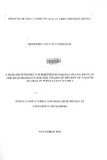| dc.description.abstract | Education is a significant factor in influencing the onset of childbearing by women. This study
examined the effects of education levels on the timing of the first birth in Kenya using data
from the Kenya Demographic and Health Survey of2003. This was a nationally representative
survey that collected data on fertility and education from sample size of 8195 women all over
the country. Age at first birth measured in completed years was the dependent variable for this
study while the independent variable was the level of education categorized into three
categories namely, no education, primary and secondary and above levels. Type of place of
residence, ethnicity, religion, and region, age at first marriage and age at first sexual
intercourse were used as control variables and operationalised using the Bogaarts framework
of 1978. The life table approach was used to estimate median age at first birth among women
by levels of education. On the other hand the estimation of the risk of a woman experiencing a
first birth given her background characteristics was carried out using Cox Proportional Hazard
Model. The results of the lifetable show that women with higher levels of education have
higher median age compared to women with no education. The analysis using Cox Regression
show that education is a significant factor in reducing the risk a first birth even in the presence
of the other factors which served as controls in this study. Education especially secondary
education remained a key factor in determining the risk of experiencing a first birth among
women in Kenya. Interesting result was that catholic women were found to have a higher
median age at first birth compared to women belonging to other religions. Similarly, Catholic
women were found to have a lower risk of having a first birth compared to women belonging
to other religions. In addition, women belonging to Somali ethnic group found to be less likely
to experience early age at first birth compared to the Kikuyu women. The study recommends
further research to establish why catholic women had a higher median at first birth and low
risk of having a first birth. The study further recommends that more efforts to provide
education should be made in order to ensure that girls achieve at least secondary and above
levels of education. This may necessitate full enforcement of the children's Act of 2001 to
retain women in school to benefit from subsidized secondary education. | en |

